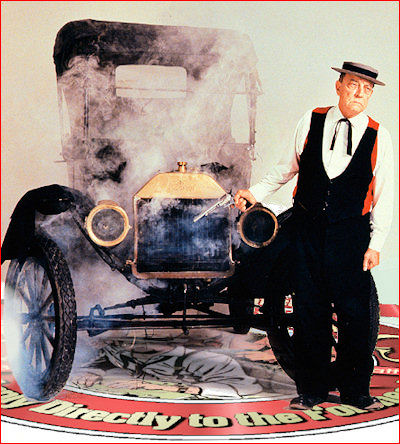
Having listened to all the talks now from the DGNC2010 conference, I think the best news is that there were no surprises. I mean, guess what: Al Mohler is still the smartest guy on the planet. John Piper can make you love God more and hate your pride -- he can help you see pride in places you didn't think you had a place for it. Francis Chan is still the Richie Cunningham of the Conference circuit. R.C. Sproul is still, as far as I'm concerned, the only guy who always gets Paul right from inside out. Rick Warren was commended by his hosts and, of course, criticized by all the right people (including me, before the torches and pitchforks come out).
So, yay team: nice one put to bed again. Jesus was praised one way or another, and we all got to go home edified. Some of us stayed home and were edified.
We all get to have our tidy theology and lives back, and we can go on reading Crossway with the right amount of humility and tranquility (that's not smugness, mind you: "smug" would be reading our Crossway on the subway or at Starbucks where people could see you reading Crossway, even if it's studying your ESVSB) to be edified that we are in the right place under God's sovereignty.

OK, I have to admit it: I did have a moment in listening to these talks and panels when I really, really felt like we had crossed into the surreal. There was one surprise. It was the first panel where Kevin DeYoung, Tullian Tchividlian, Burk Parsons and John Piper were sort of round-tabling with David Mathis soft-balling them with general questions about pastoral ministry.
The surreal part was not where John Piper called Rick Warren "an unbelievable communicator" in a completely-unironic way. It was the part late in that panel where he unironically said this (around 22:00):
Piper: I just think you should faithfully do what you love to do and are called to do, (I'm talking to Pastors now) and if it happens it happens. Now, I suppose Rick Warren would roll over in his, uh, not his grave but his study because that sounds so unpurposeful, but, I just, uh, it's just discouraging and paralyzing to take away specifics. There has to be a certain organic-ness to dreaming. Skill-sets and gifting and what he called SHAPE in his book Purpose-Driven Life are so crucial to the way you go about dreaming, the way you go about seeing what's not there. And you can just kill yourself trying to see what's not there that doesn't fit you at all. It doesn't fit your church, it doesn't fit your situation, and you may not know the dream God has planned for you, and so … you know, everyone speaks about their own trajectory … this is me talkin', not Rick Warren, and I just came to Bethlehem and I tried to preach the Bible faithfully.Now: why is that surreal? I mean, that's the reformed (small "r" intended) demographic schtick, right -- I'm just a simple preacher being faithful to God's word. That's how John MacArthur "did it". That's how Al Mohler "did it". That's how R.C. Sproul "did it". That's how Mark Dever "did it". And that, to put a fine point on it to keep our street cred, is exactly what Rick Warren said is unfaithfulness -- to be allegedly-faithful and unconcerned with fruit, to be more concerned with knowing the whole systematic ball but never leaving your study to take it out to the playground or the unreached people group.
And didn't have any other plans. I didn't. (in CEO voice) Oh, there's a 50,000 student University across the street - what's the strategy? (/voice) Well, they can come. If they want. [laughter] And there were a few other things thrown in along the way, but mainly I want to feed the sheep in such a way that the sheep love God, are so thrilled with God, they tell other people about him, and they come and worship and they love God so much, and yeah then you have to train some people and maybe a Tom Steller will join your staff and make something happen. I kinda want pastors to keep their focus clear and do a livable life, keep your wife happy, and your kids in the fold, and preach your heart out, and you really will do remarkable things. [ends at 24:25]
Somebody might say that's not surreal -- that's the kind of people we are striving to be, isn't it? But look at the underlined part there. In the midst of detailing the reformed schtick under the cover of "organic" dreaming and avoiding too-hard burdens, of all people on Earth John Piper says, essentially, that intentional evangelism is not his first concern. I mean, this is the guy who wrote Let the Nations Be Glad. This is the guy who penned Don't Waste your Life. In essence, in a very transparent and self-aware way, he admitted that he doesn't have at top of mind lost people.
That is something, I think, no one expected -- because nobody heard it. Or rather: they all laughed! Nobody squared up to it and said, "well, Dr. Piper, is that why you invited Rick Warren in the first place? Isn't that a pretty dangerous diagnosis for you, given that you're in some way a leader and mentor for the so-called 'Young Reformed' movement? It plays right into the stereotype of calvinism -- and not in a good way."

Listen: that's got to be a wake-up call for all of us. That's got to be something that makes us ring hollow on the inside. If John Piper can admit that evangelism is not on the top of his mind when preaching, then I think we are all suddenly caught with the same look on our faces that the Coyote has when he runs off the edge of the cliff.
You know what? Rick Warren has a concern for people who are going to hell. Maybe we're all correct, and he's so riddled with faults and errors and unrepentant pride in his accomplishments that his message is not what we, the well-informed, would preach. But his first instinct is, as he says, "Come and See." Come and See if this is the Messiah. Taste and see the Goodness of the Lord. Look: I see the Heavens opened, and the Son of Man standing at the right hand of God!
So maybe I don't like Rick Warren. I'm actually not going to defend Rick Warren. But maybe it's not Rick Warren who needs defending, or who needs someone to justify what he does. Maybe it's the rest of us who have a perfect Gospel which we never think about taking to lost people.
I'm sure you have a full day, and this is just a blog post. Shrug it off. But I'm headed out to the yard because there's a single talent I buried out there someplace, and I think I better go dig it up before the Master comes home and asks me what I did with it ...




 His teaching wasn't really quite what my cult made it out to be. But in itself, that wasn't a huge issue. Jesus was one religious teacher among many. A really impressive "one," true; but
His teaching wasn't really quite what my cult made it out to be. But in itself, that wasn't a huge issue. Jesus was one religious teacher among many. A really impressive "one," true; but  a daily thing.
a daily thing. God,
God, 


 you pile twigs all around my feet and douse them with lighter fluid. To be a little more specific: if you know I've had trouble with drunkenness, you won't offer me a glass of wine. If you know I battle covetousness, you won't take me window-shopping in high-end stores I've no business frequenting.
you pile twigs all around my feet and douse them with lighter fluid. To be a little more specific: if you know I've had trouble with drunkenness, you won't offer me a glass of wine. If you know I battle covetousness, you won't take me window-shopping in high-end stores I've no business frequenting.




 he word evangelical used to be a good one. The term dates back at least to William Tyndale, and it refers to the belief that the gospel message—the evangel—is the vital heart of all Christian truth. To a real evangelical, everything that is of primary importance in Christianity is embodied and summarized in the gospel, and any belief system based on an aberrant gospel is not authentically Christian.
he word evangelical used to be a good one. The term dates back at least to William Tyndale, and it refers to the belief that the gospel message—the evangel—is the vital heart of all Christian truth. To a real evangelical, everything that is of primary importance in Christianity is embodied and summarized in the gospel, and any belief system based on an aberrant gospel is not authentically Christian.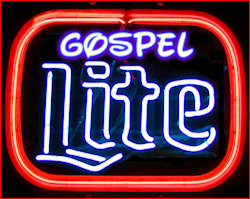 For the past fifty years or more, people calling themselves "evangelical" have been systematically watering down the gospel; filtering out the hard parts; and trying every way they can think of to tone down the offense of the cross. They have been serving up "gospel lite"—a pale imitation of the true gospel, specially distilled to taste good and go down easy. As more and more "refinements" have been made to the recipe, few people in the movement seem to be asking whether the message we're now collectively proclaiming to the world even has enough gospel left in it to be considered authentically evangelical. (It's my conviction that the correct answer to that question is no.)
For the past fifty years or more, people calling themselves "evangelical" have been systematically watering down the gospel; filtering out the hard parts; and trying every way they can think of to tone down the offense of the cross. They have been serving up "gospel lite"—a pale imitation of the true gospel, specially distilled to taste good and go down easy. As more and more "refinements" have been made to the recipe, few people in the movement seem to be asking whether the message we're now collectively proclaiming to the world even has enough gospel left in it to be considered authentically evangelical. (It's my conviction that the correct answer to that question is no.) It's crucial to understand that the demise of the contemporary evangelical movement does not stem merely (or even primarily) from a failure of leadership. It is mainly owing to the whole movement's chronic neglect of the gospel as it is presented in Scripture. All those attempts to tone down and tame the gospel have changed the fundamental character of evangelicalism's message. By systematically doing away with all the hard parts of the message, evangelicals have essentially done away with the gospel itself.
It's crucial to understand that the demise of the contemporary evangelical movement does not stem merely (or even primarily) from a failure of leadership. It is mainly owing to the whole movement's chronic neglect of the gospel as it is presented in Scripture. All those attempts to tone down and tame the gospel have changed the fundamental character of evangelicalism's message. By systematically doing away with all the hard parts of the message, evangelicals have essentially done away with the gospel itself.

 he church is a separate and distinct thing from the world. I suppose there is such a thing as "the Christian world"; but I do not know what it is, or where it can be found. It must be a singular mixture. I know what is meant by a worldly Christian; and I suppose the Christian world must be an aggregate of worldly Christians. But the church of Christ is not of the world. "Ye are not of the world," says Christ, "even as I am not of the world."
he church is a separate and distinct thing from the world. I suppose there is such a thing as "the Christian world"; but I do not know what it is, or where it can be found. It must be a singular mixture. I know what is meant by a worldly Christian; and I suppose the Christian world must be an aggregate of worldly Christians. But the church of Christ is not of the world. "Ye are not of the world," says Christ, "even as I am not of the world."

 n the topic of church activities, Christian testimony, and our collective influence on the world, I wanted to point out that the message we send with our lifestyle is to a very large degree subject to the interpretation of the observer anyway.
n the topic of church activities, Christian testimony, and our collective influence on the world, I wanted to point out that the message we send with our lifestyle is to a very large degree subject to the interpretation of the observer anyway. o I grew up in a modernist church where we had dances all the time. It was the default activity for our youth group. And if you think church dances are a novel idea, you've been wading in the shallow-evangelical end of the pool for too long. In fact, the most famous incident regarding a church dance I can think of occurred in 1949.
o I grew up in a modernist church where we had dances all the time. It was the default activity for our youth group. And if you think church dances are a novel idea, you've been wading in the shallow-evangelical end of the pool for too long. In fact, the most famous incident regarding a church dance I can think of occurred in 1949.
 Also, I'm not suggesting (as some of our more zealous fundamentalist brethren might want to) that the club atmosphere in that one Colorado church is directly to blame for the fall of the World Trade Center towers.
Also, I'm not suggesting (as some of our more zealous fundamentalist brethren might want to) that the club atmosphere in that one Colorado church is directly to blame for the fall of the World Trade Center towers. watched the following video last April or thereabouts, and I intended to link to it on our blog. But I can't find any reference to it in our archives, so I rather suspect it hasn't yet got the sort of attention it deserves from Pyro-readers.
watched the following video last April or thereabouts, and I intended to link to it on our blog. But I can't find any reference to it in our archives, so I rather suspect it hasn't yet got the sort of attention it deserves from Pyro-readers. There are lots of sound bites here worth singling out. I'll let you discover them all for yourselves. My favorite is the remark made by the woman at about 4:20.
There are lots of sound bites here worth singling out. I'll let you discover them all for yourselves. My favorite is the remark made by the woman at about 4:20.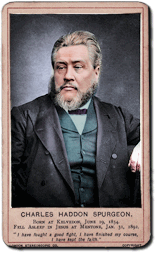
 he blind man has not come into the world of light and color, and the unregenerate man has not come into that world of spirit, and hence neither of them is capable of judging correctly.
he blind man has not come into the world of light and color, and the unregenerate man has not come into that world of spirit, and hence neither of them is capable of judging correctly.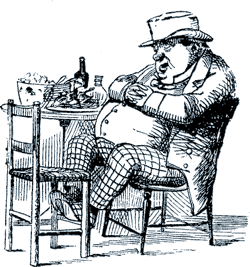 He was also as proficient in the quantity as in the quality, and disposed of meats and drinks in a most wholesale manner. His retreating forehead, empurpled nose, and protruding lips, made him—while eating, at least—more like an animal than a man.
He was also as proficient in the quantity as in the quality, and disposed of meats and drinks in a most wholesale manner. His retreating forehead, empurpled nose, and protruding lips, made him—while eating, at least—more like an animal than a man.
 posted by Phil Johnson
posted by Phil Johnson don't know who made this spot-on parody of Rob Bell's
don't know who made this spot-on parody of Rob Bell's 
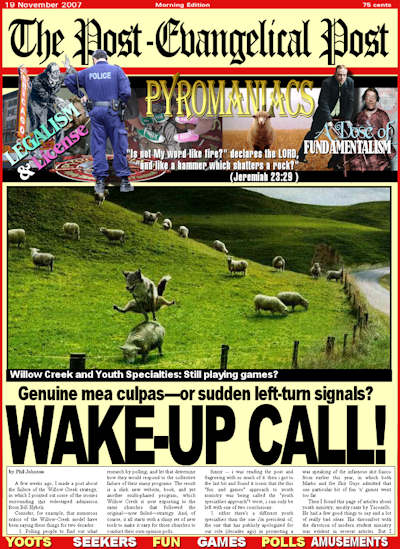
 few weeks ago, I made
few weeks ago, I made  Now (in matters only tangentially related to that)
Now (in matters only tangentially related to that)  But I've been looking for the apology Marko referred to. He might have been speaking of a famous article written by the late Mike Yaconelli:
But I've been looking for the apology Marko referred to. He might have been speaking of a famous article written by the late Mike Yaconelli:  Instead of reemphasizing the centrality of Scripture in what we teach our young people, Youth Specialties took a hard turn toward the leftward extreme of the Emergent spectrum. They now publish
Instead of reemphasizing the centrality of Scripture in what we teach our young people, Youth Specialties took a hard turn toward the leftward extreme of the Emergent spectrum. They now publish  ut of Ur has
ut of Ur has  No, thanks. Out of Ur includes a link to
No, thanks. Out of Ur includes a link to  n a similar vein, several people have pointed me to
n a similar vein, several people have pointed me to 